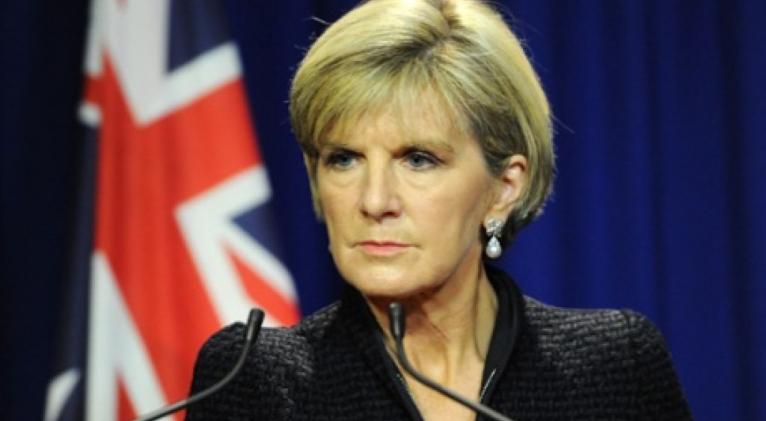Great Barrier Reef: Julie Bishop sent US a briefing after Obama criticism

Bishop said on Friday the government did not believe the reef was in danger – a comment that contradicts the scientific consensus that it is.
The 2014 outlook report from the Great Barrier Reef Marine Park Authority said: “Climate change remains the most serious threat to the Great Barrier Reef. It is already affecting the reef and is likely to have far-reaching consequences in the decades to come.”
Unesco will consider next year whether to list the reef as officially in danger.
Bishop has taken the unusual step of pushing back publicly against the Obama administration in an effort to minimise the domestic political fallout from the recent step-change on climate action by the US.
Bishop told the ABC on Friday morning her office had sent a briefing to the White House after Obama’s speech in which he highlighted the vulnerability of the reef to the effects of climate change.
The foreign minister said she had met the US secretary of the interior, Sally Jewell, in Sydney before the G20 and outlined “in considerable detail Australia’s commitment and capacity to preserve the Great Barrier Reef”.
“And I pointed out that we were working with the heritage committee and with Unesco to ensure that the barrier reef remains as healthy and protected as is humanly possible,” Bishop told the ABC.
“I pointed out that mining and drilling and gas exploration are banned by law from the Great Barrier Reef region and that we had acted to prevent the dumping of capital dredge waste in the marine park. Indeed, [environment] minister Greg Hunt announced that during the World Parks Congress, that we will ban that by law.”
Bishop said the briefing went to specific policy actions Canberra was taking with Queensland “to not only halt but reverse the decline in the quality of water entering the Great Barrier Reef, which is one of the causes of coral degradation”.
She said the Abbott government was very confident current policies would preserve and conserve the reef for generations to come and that was the message she had conveyed during her meeting with Jewell.
Bishop said she was “surprised that it appeared President Obama hadn’t been briefed on that”.
In a separate interview with Sky News, Bishop said the government did not believe the reef was in danger. “Of course, the Great Barrier Reef will be conserved for generations to come,” she said.
The Abbott government has been put on the back foot by the recent announcement that the US and China will work collaboratively to reduce their emissions, and by comments from world leaders during and after the G20 summit highlighting the importance of global action to address climate change, including contributions to the international Green Climate Fund.
Even Canada, a country that previously lined up with Australia against contributions to the global climate fund, has now come on board with a $300m contribution. On Thursday in Berlin 30 countries pledged $9.3bn to the fund.
The foreign minister also took exception to a recent report from the United Nations suggesting Australia would not deliver on its emissions reductions commitments. “I don’t accept Australia won’t meet its target. I don’t know where this report came from because they certainly didn’t consult with agencies in Australia.”
Bishop said the UN’s assessment seemed to be predicated only on the repeal of Labor’s clean energy scheme, and not on the replacement policies the Coalition had enacted, including the Emissions Reduction Fund.
Labor’s foreign affairs spokeswoman, Tanya Plibersek, said on Friday the diplomatic pushback against the US was “petulant”, and underscored how isolated Australia now was on climate change. Plibersek said in Sydney the Abbott government had tried to keep climate change off the G20 agenda, but the prime minister had been outflanked by other world leaders.
Labor’s environment spokesman, Mark Butler, said the scientific consensus on the vulnerability of the reef was clear.
“Just this year, the World Heritage Committee ‘noted with concern’ the Abbott government’s lack of action to protect the Great Barrier Reef, and went on to recommend the reef for consideration on the list of ‘world heritage in danger’ sites in 2015,” Butler said on Friday.
“It seems it’s only the Abbott government that fails to accept that climate change is going to take a significant toll on our Great Barrier Reef, unless we act now,” he said.
“It is embarrassing.”













Add new comment